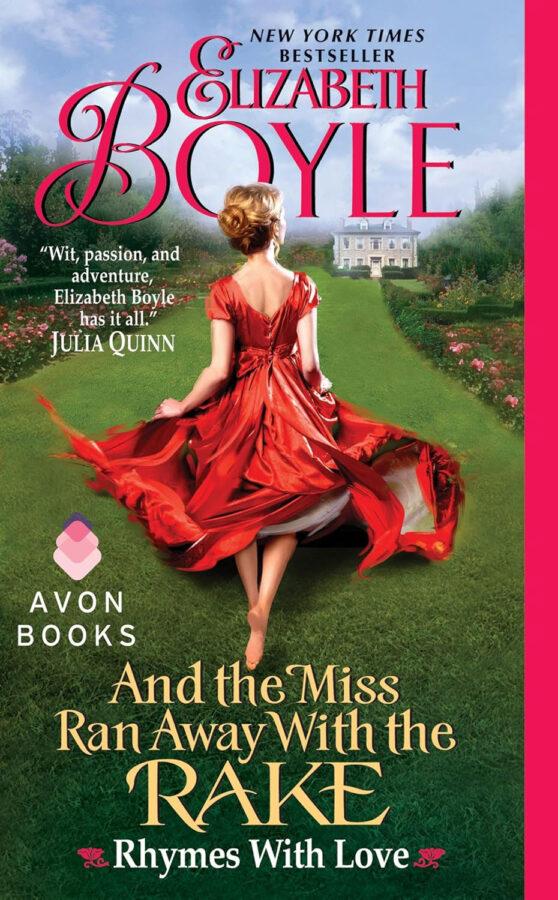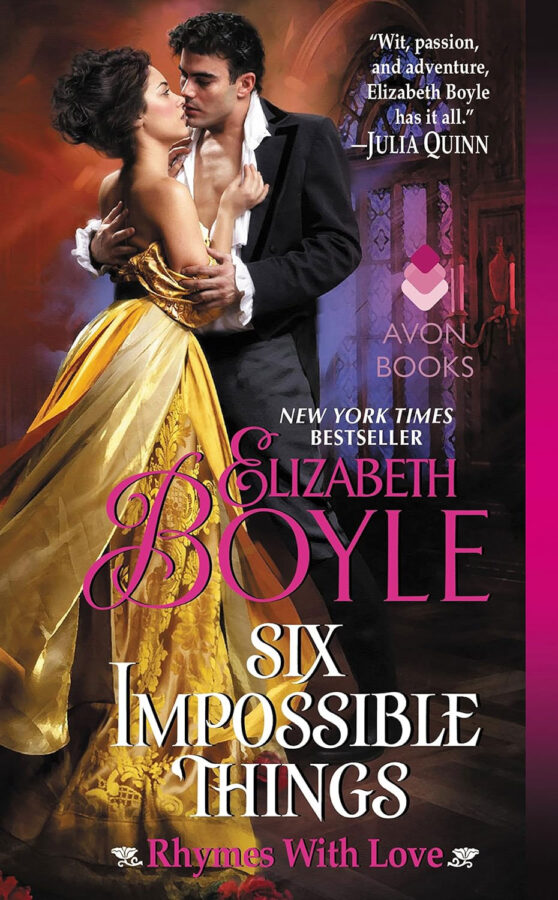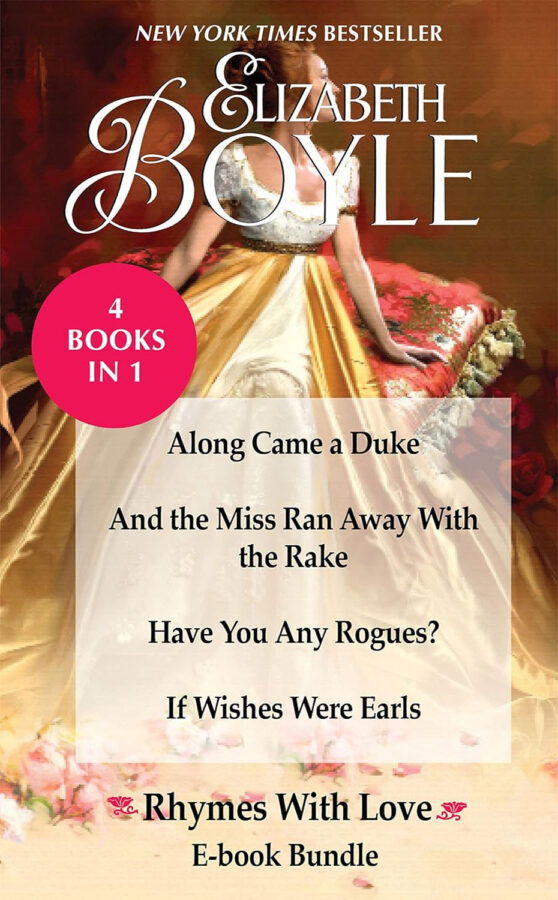The Viscount Who Lived Down the Lane
Rhymes with Love, Book 4
A wounded war hero has no desire for society or love until a meddling miss and her incorrigible cat move in across the lane and decide to reorganize his shattered life.
Arriving in Mayfair, Louisa Tempest is frightened when her incorrigible cat bolts from the carriage and dashes into a neighbor’s house, until she comes face-to-face with the reclusive Viscount Wakefield. But even more horrifying than his foul temper is the disarray in which she finds his home. Convinced his demeanor would improve if his household were in order, Louisa resolves to put everything to rights.
Much to his chagrin, Wakefield finds it impossible to keep the meddling Louisa out of his home, invading his daily life with her “improvements,” and his nights with the tempting desires she sparks inside him. Wounded in the war, he’s scorned society ever since his return . . . until Louisa opens the door to his heart and convinces him to give love a second chance.
Beauty & The BeastTortured HeroGrumpy/SunshineMatchmaking Cat
Areowwwwww! The unholy complaint filled the carriage.
“You should have left that foul creature back in Kempton, Miss Tempest,” Mrs. Bagley-Butterton complained for about the hundredth time.
Which equaled the number of times Hannibal had let out that ear-piercing yowl from the basket in which he was trapped.
“He doesn’t like being penned up so,” Miss Louisa Tempest said in defense of her cat. “And I couldn’t leave him behind.”
There was a sigh of resignation from beside Louisa. Miss Lavinia Tempest, Louisa’s twin, made a very deliberate show of looking out the window. She wasn’t about to rise to Hannibal’s defense.
Never would.
Louisa suspected her sister shared Mrs. Bagley-Butterton’s exasperation and wished poor Hannibal back in Kempton as well.
“I only hope your godmother is an understanding sort,” the matron continued, shifting in her seat in the carriage and eyeing the large basket on Louisa’s lap with an air of disdain and suspicion. She had protested vehemently against the cat being brought along, but she could hardly prevent the matter when the carriage conveying them to London belonged to the girls’ father, Sir Ambrose Tempest. “I know I wouldn’t have that cat in my house.” She sniffed loudly.
“Then it is fortunate that we are staying with Lady Charleton,” Louisa replied. “She is so kind and generous.” She smiled as she said these words. Lavinia kept her gaze fixed out the window, though it was obvious from the way her shoulders shook that she was having a terrible time keeping from laughing at the implication.
“Yes, quite. How kind she is to offer to bring the two of you out … well, without …” Mrs. Bagley-Butterton sniffed yet again, Louisa’s slight going right over her head, and unable to say quite what she wanted.
Whatever was this Lady Charleton thinking, bringing out two unknown misses of such dubious lineage?
Then again, it wasn’t like Louisa hadn’t heard the aside Mrs. Bagley-Butterton had made to their housekeeper before they’d departed Kempton.
“Does this Lady Charleton know?”
“She’ll learn the truth soon enough, ma’am,” Mrs. Thompson had replied. “So will all of London, poor dears. Secrets always seem to have a way of winkling out, now don’t they?”
Yes, the horrible, awful secret.
Louisa pressed her lips together and stared out the window as the brick and stone of London began to surround them. Perhaps, just maybe, by some bit of chance, the truth wouldn’t come “winkling out” as Mrs. Thompson avowed, and Lavinia could have the Season she’d always wanted.
At least this was what Louisa hoped as she looked at the gray and foreboding walls surrounding them.
Oh, this wasn’t Kempton, with its green hills and grand oaks.
How she wished she were there in that dear little village. She would be if it hadn’t been for two things: the recent marriages of three spinsters from their once accursed village, and their godmother’s invitation to spend the remainder of the Season in London.
Had the world gone mad? Kempton misses didn’t get married (unless they wanted to run the risk of going mad or, worse, seeing their groom meet some horrible and tragic fate), and godmothers didn’t just suddenly remember old promises.
Yet here they were, she and Lavinia, arriving in London to do just that: have a Season and if Lavinia was lucky (or unlucky, as it might be) find someone willing to risk life and limb to marry her.
If only Louisa could explain her unwillingness to marry to her sister. But that would mean telling Lavinia the truth Louisa had only discovered by chance. Even Papa had been deaf to her concerns, brushing off her worries that “such old business will hardly concern the tabbies of London.”
So Louisa kept her silence, and hugged Hannibal’s basket a little tighter, glad to have him with her. Her one-eyed, half-an-ear-missing, mangy tabby of a tom seemed to be the only one who listened to her of late.
And right on cue, Hannibal let out another terrible yowl.
Yes, well, his opinions weren’t always well timed.
“It is most kind of you to come with us to London when Papa was prevented from doing so,” Lavinia interjected quickly, probably hoping to stave off another complaint by Mrs. Bagley-Butterton.
“Fortune has a way of smiling on me,” Mrs. Bagley-Butterton declared, her disapproving gaze fixed on Hannibal’s basket. “Your father’s accident was my blessing. Now I will be in Town for the arrival of my first grandchild. As I should be. These London midwives will only make a muddle of things—and I doubt they will have eggs as fresh as these,” she said, nodding to the basket of provisions that took up most of the seat next to her, “to make a good healthy coddle for my son’s wife after she delivers. She’s a London girl.” This was also said with a suspicious sniff. “Yes, yes, indeed, your father’s broken leg was a most fortuitous event. If he hadn’t tumbled over that stile, I might not have managed to arrive in time.”
Louisa doubted very much that Mrs. Bagley-Butterton’s son and daughter-in-law shared that sentiment, but she kept her opinions to herself. As much as she was loath to admit it, she’d had an equally uncharitable thought when the footmen had carried her father home the other day.
Finally! Something that would prevent them from leaving Kempton.
But she hadn’t realized the extent of Lavinia’s determination.
Not go to London? Her sister had been horrified. They were already a bit on the shelf—and to wait another year? Lady Charleton might not feel so obliged then to bring out a pair of spinsters well into their decline, Lavinia had argued.
Louisa’s arguments to the contrary—that their dear papa needed them—had fallen on deaf ears. The Society for the Temperance and Improvement of Kempton would be close at hand if Sir Ambrose needed anything, Lavinia declared.
Of course they would, Louisa knew. Every single member over a certain age had been delighted to offer her assistance.
Help the poor, widowed Sir Ambrose while his daughters were in London? Why, there had been a veritable stampede of ladies, baskets in hand, all willing to give up their time to sit with the ailing (and eligible) scholar.
It seemed Louisa was the only spinster in Kempton who didn’t want to get married.
And yet to explain the truth to her sister the horrible secret even she wasn’t supposed to know, would mean breaking her sister’s heart. So Louisa had tried another tack.
“Lavinia, you know we cannot go out in society,” she’d argued on the morning before they’d left. “Neither of us can dance a single step without blundering about.”
“We will learn,” Lavinia had said with every ounce of stubborn determination she possessed. “Never fear, there will be two gentlemen in London, or somewhere, who won’t mind if we … if we aren’t … perfect. ”
And that was where her sister had stopped. For a moment, Louisa had almost dared ask if Lavinia knew the truth—yet to ask her sister would mean having to drag that horrible, awful secret out for a full airing.
The curse that was all their own.
Though, given Mrs. Bagley-Butterton’s comments to their housekeeper, it seemed their affliction was no secret in Kempton. Then again, there were no such things as secrets in a village as small as Kempton.
“In London, no one knows us and I am certain any number of ladies arrive without knowing a quadrille,” Lavinia had added. “Good heavens, if Tabitha Timmons of all people can find a duke—a duke, Louisa—and Daphne Dale can marry a Seldon, and Harriet Hathaway can become a countess—our Harriet, married to an earl—well, certainly we can be afforded two understanding gentlemen. Nothing so grand as a duke, but I think a viscount or even a baron isn’t too much to ask for.”
A viscount, indeed! Not for all the viscounts in England would Louisa step foot in society if it meant …
But it was too late now, for the carriage slowed as it rounded a corner and then came to a stop before a grand house.
“This must be Hanover Square,” Lavinia announced, nearly tumbling out of the carriage in her haste to get going on their “grand adventure,” as she called it. Lavinia would have suffered plague-ridden battlefields (as if three days in Mrs. Bagley-Butterton’s company wasn’t a close second) if only to arrive at Lady Charleton’s house and be launched into society.
Hannibal, hearing the door open and having no desire to be left in the carriage, let out another ferocious yowl. Louisa eyed the basket and shuddered. Oh, he was going to be one vengeful tomcat when he was finally released. Looking up at the elegant residence before them, with its fine white stone and elegant railing, she hoped Lady Charleton had some old chair or sofa that she didn’t mind being mauled.
Or a carpet that needed to be replaced. Sooner rather than later.
“I suppose this address is proper enough,” Mrs. Bagley-Butterton declared as she glanced up at the fine house that took up the corner of the square. “They’ll have room for you, and for that beast as well, if Her Ladyship doesn’t send it back to Kempton with the carriage—” Her pursed lips and raised brow said all too clearly how she wanted to finish that sentence.
Or have it drowned in the Thames as it ought to be.
“Whatever do we do now?” Lavinia asked Louisa as the coachman and his assistant began unloading their trunks and settling them down on the curb before the house. The cases and boxes quickly began to block the sidewalk, and passing Londoners glared at them as they dodged through the hodgepodge of traveling cases.
“I suppose we knock,” Louisa said, resolving to do just that. She marched up the steps and gave the bellpull a firm tug, reminding herself to make her introduction sound sincere no matter how much she wanted to turn around, snatch up Hannibal’s basket, tow Lavinia back into the carriage, and order John Coachman to dash back to Kempton as quickly as possible.
But whatever she planned on saying—or doing—was interrupted by another yowling fit by Hannibal. The murderous complaint made it sound as if he were being skinned alive—loud enough for a poor old cart horse in the street to rise up in its traces and nearly bolt, and a nanny with her charges to bundle the children close and tug them in the opposite direction.
“Silence!” Mrs. Bagley-Butterton declared and gave the basket a swift kick.
She watched in horror as Hannibal’s prison overturned and its contents spilled out. “No!” Louisa cried out. Hannibal, meet London. London, meet Hannibal.
Needless to say, Hannibal was not impressed with his unfamiliar surroundings and let out yet another deafening howl of complaint.
Now, up and down the street, doors were opening and curtains parting, not that Louisa had much time to notice. She knew she had to get ahold of her unruly cat before he bolted in a mad dash.
She raced down the steps, but it was too late, Hannibal had seen the light of day and wasn’t about to surrender his freedom. Not easily. Not anytime soon.
He went dashing out into the street—through the legs of a horse pulling a fancy curricle. The owner cursed and most likely would have added an ungentlemanly hand gesture if he wasn’t at the moment struggling to control his high-strung horse.
Louisa would have followed into the busy street, but thankfully at that point, Hannibal reversed course and ran toward the house—right past her and up the steps.
Except it was the wrong house.
And at the very worst moment, the door opened and Hannibal streaked past an imperious-looking butler.
“Oh, no,” Louisa gasped as she made an equally mad dash to follow her cat.
“Louisa Tempest! Don’t let him ruin everything,” Lavinia cried after her.
Better Hannibal returns us to Kempton in disgrace than the world discovers the horrible, awful truth …
At the top of the steps, she collided with an elderly butler, only pausing for a second to offer a rushed “I am so sorry.”
It wasn’t that Louisa was apologizing for her uninvited arrival into the house, but rather for what was about to happen.
She paused in the foyer to get her bearings and all too quickly had them, for up the stairs there was almost immediately a very loud crash. Followed by a triumphant yowl of conquest.
True to his name, Hannibal was ready to pillage.
Crash!
Pierson Stratton, Viscount Wakefield opened one eye and shuddered.
If the infernal racket echoing through his house was any indication, he had to assume that Napoleon had crossed the channel and Mayfair was under siege.
That, or his French chef was skinning a cat for breakfast.
Which would no doubt be served burnt or half done like everything else the fellow “cooked.”
Outside his darkened room there was another cacophony ringing through the halls. Crash! Yowl!
Pierson sat halfway up and cringed. His head pounded furiously in protest at this early awakening, and as the noise came closer—boots coming up the stairs, another yowl and the cry of a voice he didn’t recognize.
“Hannibal! You get back here, you bad cat.”
Good Lord! Who was in his house? Since none of his family dared cross his threshold, and Tiploft knew better than to let anyone enter, it had to be thieves or the French.
Either way, it would be the last time whoever it was committed such folly.
Struggling out of bed, he ignored the pain in his head, winced at the familiar ache in his wounded leg, and threw his wrapper over his shoulders, giving the tie a half hitch as yet another piercing howl ripped through the halls.
This was exactly why he kept his household so small.
So he could live in peace.
Catching up his walking stick and plucking his pistol from the drawer of his nightstand, he crossed his bedchamber as quickly as he dared, then yanked open the door, pistol held before him.
In his blurry-eyed state, he saw the rush of someone coming down the hall. “No further,” he ordered. “Not one step further or it shall be your last.”
It was then that Pierson truly opened his eyes.
Thankfully before he fired.
For there before him was a doe-eyed minx, her beribboned bonnet askew and a tumbling mess of brown hair falling out from beneath it.
No, not brown. More like mahogany. If one was inclined to look a bit closer.
Which, bleary-eyed as he was, Pierson did. Look, that is.
Yes, definitely mahogany.
And definitely a miss as his gaze fell lower over a curved shape that could only be female.
In his house, no less.
The viscount yanked his gaze away from the chit. “Tiploft! What is the meaning of this?”
His butler, who had hurried up from behind the lady, had his horrified gaze fixed down at the viscount’s feet and Pierson glanced down as well.
Then he knew without a doubt he was still drunk. What the devil sort of vermin was this?
The mangy ball of fur let out a sort of meow, except it was more guttural, like a rrooowww, as if the creature was prone to indulging in too many cigars and cheap brandy.
Something Pierson knew a bit about. However, not the cheap brandy part. He couldn’t abide the stuff. And thankfully he was wealthy enough that he could keep a decent cellar.
Rr-ooowww, the animal repeated, eyeing the viscount as if he were measuring him—one beast to another.
Pierson wasn’t even sure the creature was a cat—for it was missing one eye, most of its tail and a good portion of one of its ears.
It rather looked like his former batman—Russell—a boxer of some note, and a fellow known for his temper and rash judgment. He and Pierson had gotten along famously.
Until he, like so many others, had fallen on the retreat to Corunna.
Poor demmed bastard. Russell had gone down cursing and died in the agony of an infection.
The viscount shut his eyes against the memory and wished for his brandy bottle—the one that kept such instances at bay.
But there was no chance of that, not with what felt like half of London in his house.
In. His. House.
That was enough to coax his eyes open. “What the devil,” he muttered as the creature, the one as yet to be determined if it was a cat, began to wind around his legs, its tattered coat brushing against him.
Then the animal had the audacity to roll around in front of him as if it was his—the viscount’s—duty to pet him.
“You had best scratch him. Quickly,” the lady advised, nodding down at the beast that looked capable of taking a few fingers and a good part of the rest of his hand.
“I never,” he told the beast.
Not that it listened, for it proceeded to wind its way beneath Pierson’s wrapper, rubbing against his legs, and then popping out again, only to start coughing.
“Oh, no,” gasped the young lady.
And then he saw why.
The cat proceeded to cast up its accounts right in front of the viscount’s bare toes.
“I warned you,” the lady said, sounding hardly sorry for the mess on the floor.
Praise for The Viscount Who Lived Down the Lane
Booklist Starred Review
PNWA Nancy Pearl Book Award Finalist
Romantic Times Reviewer’s Choice Award Winner
“Boyle once again displays her deft hand at combining buoyant wit with deep emotion.” —Booklist, starred review

















